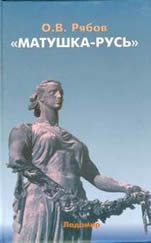"Mother Russia"
O.V. Riabov
An Experience of Gender Analysis of the Search for Russian National Identity in Russian and Western Philosophy of History
 Summary
Summary
The concept of Mother Russia - the starting-point of the monograph - used more often to designate a kind of "genuine Russianness", is very popular both in Russian and Western texts. This concept displays the presence of gender metaphor in national representations and contains two ideas: the first idea is the "matrifocal" essence of Russian culture and the second one is that Russia has rather feminine features meanwhile the West has rather masculine ones.
What functions do these metaphors perform in the national identity of Russians? What is their role in constructing the image of Other in international relations? What are the main modes of Russian thinkers' attitudes to this gender characteristic of Russia? How is the discourse of "Mother Russia" included in the expectations about gender relations? Why can these methaphors, connecting completely various dimensions of social life, be possible?
The monograph is devoted to the myth of Russia which is a kind of "the second reality", formed of the philosophical speculations, stereotypes, biases, prejudices. Influencing on the peoples' feelings and behaviour, it causes the strategies of life of every human being and the destiny of nation as a whole; this reality is not less significant than "the first reality".
The research is based first of all upon Russian and Western texts about Russia written in various periods of history. Among the authors are Maxim the Greek and Andrey Kurbsky, A. Herzen and F. Dostoevsky, V. Solov'ev and V.Rozanov, N. Berdyaev and D. Merezhkovsky, I. Il'in and I. Solonevich, J.G. Herder and R. Steiner, A. Camus and H. Adams, I. Spengler and W. Schubart and others. The second group of materials includes the texts of political journalism, popular songs, various forms of visual representations of "Mother Russia" (posters, advertising, monuments, illustrations from newspapers).
Theoretical issues of gender aspect of national identity are analysed in Chapter I "National Identity through the Prism of Gender Studies" . The author considers the key concepts of the research ("gender", "gender picture of the world", "national identity") to reveal the reasons, modes, mechanisms and social functions of including gender metaphors, the views of male and female principles in national representations and international relations.
em>Chapter II "A Woman with the Sun for the Garment" is devoted to analysing the idea of femininity of Russia - as the most well-known and influential mode of the gender conceptualization of Russianness. The views of Russia as "the extreme Other" for the West, their function in the feminisation of the country in philosophical discourse, the gender characteristics of various sides of "the mysterious Russian soul" are investigated.
The views of the question of the influence of female principle in its maternal mode on the specific features of the Russian civilization and the Russian type of personality, the impact of these views of gender characteristics of Russia are considered in Chapter III "The Maternal Principle of the Russian Life" through the prism of three concepts - the notion of Mother-Land, the idea of Russia as "the Home of Bogoroditsa-Theotokos", the myth of Russian woman.
The various modes of criticizing the idea of femininity of Russia in the alternative types of discourse, the discussions about the gender identity of Russia in Russian and Western philosophy of history are the centre of the author's attention in Chapter IV "The Eternal Masculine in the Russian Soul".
The monograph is continuation of the author's previous books "Woman and the Feminine in the Philosophy of the Russian Silver Age" and "Russian Philosophy of the Feminine (XI - XX cc.)", which were devoted to researching the concepts of the feminine and the masculine in Russian philosophical discourse and to revealing the influence of the search for the national identity upon the philosophy of the feminine and the image of the female principle in the Russian culture.